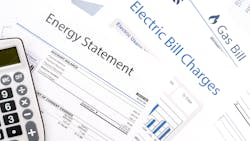Illinois Commission Strikes Consumer Protection Agreements to Help Prevent Disconnections
The Illinois Commerce Commission (ICC) unanimously approved historic consumer protection agreements to help electric, natural gas, water, and sewer residential customers hard hit by the ongoing COVID-19 pandemic. These are intended to mitigate outstanding consumer debt and prevent disconnections before the voluntary winter moratorium on disconnections expires on March 31, 2021.
Consumers struggling to pay their energy bill must call the utility to receive benefits and prevent disconnection. The stipulated agreements were negotiated and signed by ICC staff, the state's largest public utilities, and participating consumer advocate groups. The terms of the stipulated agreements allow utilities to send disconnection notices on a staggered basis, starting on April 1, 2021, but the notices must notify customers that they may be eligible for a deferred payment arrangement (DPA) in order to prevent disconnection.
The large electric and gas stipulated agreement includes the following utilities: Ameren Illinois Co., Commonwealth Edison (ComEd), Northern Illinois Gas Co. (Nicor Gas), North Shore Gas Co., and The Peoples Gas Light and Coke Co. The second stipulated agreement covers large water and sewer utilities and includes: Aqua Illinois, Illinois-American Water Co., and Utility Services of Illinois.
"With continued vigilance, we are beginning to see light at the end of the tunnel as the number of new COVID-19 infections continues to trend downward and more residents get vaccinated. To aid in our recovery, I want to commend the ICC, the Illinois Attorney General's Office, the City of Chicago, participating utilities, and other consumer advocate groups for negotiating agreements that will ease the burden on residents who have fallen behind on their utility bills during the pandemic," said Illinois Governor J.B. Pritzker.
"The past year has been extremely difficult for everyone, and it has been especially hard for low-income residents and those who lost jobs because of the public health crisis. The financial toll has been devastating," said ICC Chairman Carrie Zalewski. "Since the public health crisis started, the ICC has been very aggressive in making sure residents have access to critical utility services while putting into place protective measures to help them afford their utility bills as the state begins to recover. The agreements we approved will go far in helping customers minimize arrearages and stay connected. But customers need to be proactive and call their utility for help."
For customers that are disconnected, the utilities will waive reconnection fees for low-income customers through June 30, 2021. Through July 10, 2021, utilities will reconnect those customers whose income is 300% or less of the federal poverty level based upon payment of 25% of the outstanding balance, which may be paid with bill payment assistance funds (if available). The remainder of the arrearage will be incorporated into a DPA.
Among other terms of the stipulated agreements with the state's largest utilities are:
- Each utility will offer more generous DPAs for residential customers who have not been disconnected, starting no later than April 1 through June 30, 2021, with terms of at least more than 18 months. Bill payment assistance funds may (if available) be used to reduce arrearages and customers may seek to negotiate DPAs based on the reduced arrearages.
- Low-income customers will continue to be exempt from late payment fees and deposits.
- Each utility will continue, or renew, their Bill Payment Assistance (BPA) Program through 2021 with a portion of the funds allocated for reconnection assistance.
- Residential customers with arrearages greater than 30 days will be sent targeted communications with information about available financial assistance, including BPA Program funds, and available payment arrangements, including federally-funded utility assistance programs. Communications will stress the need for the customer to call the utility.
- COVID-19-related costs incurred by a utility to implement the stipulation are recoverable by each utility.
- Signers of the stipulations have agreed to meet monthly through July 20, 2021, to discuss stipulation implementation efforts and outcomes.
The Commission reopened the proceeding in Docket No. 20-0309. This docket was originally opened on March 18, 2020, by the Commission to direct Illinois gas, water, sewer, and electric distribution utilities to immediately cease disconnections of utility service and late payment fees for nonpayment in response to a request by the governor and Illinois Attorney General Kwame Raoul. The Emergency Order also ordered the utilities to revise more flexible credit and collection procedures to ensure customers remain connected to essential utility services when the emergency status ends.
In April 2020, negotiations commenced between ICC staff, consumer advocate groups, and the utilities. This resulted in two stipulated agreements for large and small utility groups. These agreements, which were approved in June 2020, included a number of landmark consumer protections — among them newly formed bill payment assistance programs, extended DPAs, reconnection of low-income customers without fees, and deposits waived.
Throughout the pandemic, the ICC repeatedly returned to the utilities requesting extension of voluntary moratoriums on disconnections as a safety net for customers. Aside from a brief period during fall 2020, a moratorium on disconnections for many residential customers has been in place for the entirety of the pandemic. The latest moratorium, which extended through the winter months, will expire on March 31, 2021.
In addition to the utilities named above, stipulated agreement participants include the Office of the Illinois Attorney General, the City of Chicago, Community Organizing and Family Issues, the Citizens Utility Board, the Legal Aid Society of Metropolitan Family Services, Allen Cherry, and ICC staff. The stipulated agreements do not include municipal and cooperative utility systems, which are not statutorily regulated by the ICC.
"The ICC strongly encourages customers unable to pay their energy bills to call the utility and express their hardship. Do not disregard disconnection notices. Help is available, but customers must pick up the phone and call their utility," said Zalewski.
For more information about the ICC's COVID-19 response, visit here. To read the full order and stipulated agreements, visit here.
